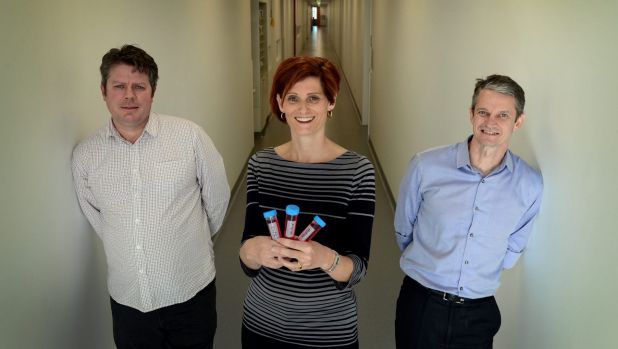
Left to right: Paul Gilson, Tania de Koning-Ward and Brendan Crabb. Photo: Penny Stephens
The global race to develop the next generation of malaria drugs has been given a boost after Australian scientists discovered how to starve the malaria parasite of nutrients, effectively killing it before it takes hold.
The breakthrough, published in Nature on Thursday, comes at a time when the parasite has developed a resistance to anti-malarial drugs, with researchers and health care workers growing increasingly desperate for replacement treatments.
‘’It’s really exciting because we are on our last drug and when that drug goes, there are no more drugs to treat malaria,’’ Burnet Institute director Brendan Crabb, a microbiologist and co-author of the paper, said.

Transmitted via infected mosquitoes, the malaria parasite multiplies in the liver and then invades red blood cells. Photo: Penny Stephens
Parasite resistance to the present drug, artemisinin, has been detected in four countries in south-east Asia: Cambodia, Myanmar, Thailand and Vietnam. The mosquito that carries the parasite has also developed a resistance to at least one insecticide used for malaria control in 64 countries.
Transmitted via infected mosquitoes, the malaria parasite multiplies in the liver and then invades red blood cells.
Once inside a red blood cell, the parasite settles in and starts spreading its proteins through the red blood cell cytoplasm, which helps it survive and absorb nutrients.
‘’There are hundreds and hundreds of proteins that the parasite needs to get across into the red blood cells and this study has shown that there is only one way for all the proteins to get out into the red blood cells,’’ said co-author Tania de Koning-Ward, from Deakin University’s medical school. ’’If we block that pathway, then we kill the parasite.’’
The two collaborating research groups, one from the Burnet Institute and the other from Deakin University, each managed to deny the parasite the proteins it needs to survive but did so using different techniques.
Professor Crabb and colleague Paul Gilson worked with infected human blood cells grown in the incubator at the Burnet Institute, while Associate Professor de Koning-Ward and her team used the parasite that causes malaria in mice to test the efficacy of blocking the proteins from being released.
‘’We basically showed the same results,’’ Associate Professor de Koning-Ward said.
The team first outlined its theory in a 2009 Nature paper but this latest research proves the theory works in practice.
The development is significant as it relies on a new mechanism, which means drugs developed using this novel technique will be unlike the drugs now on the market.
Blocking the release of the parasite’s proteins also appeared particularly potent, killing the parasite within six hours.
The malaria parasite has about 5000 genes. The study used genetically modified parasites, with the gene responsible for transferring proteins manipulated so it could be switched off.
Professor Crabb said the cost of developing new malaria drugs was about half a billion dollars. He said it took five to 10 years for new treatments to reach the market.
According to the World Health Organisation’s 2013 World Malaria Report, released last December, about 207 million cases of malaria were recorded in 2012 with 627,000 deaths. Ninety per cent of all malaria deaths occur in sub-Saharan Africa, particularly Nigeria and the Democratic Republic of the Congo.
